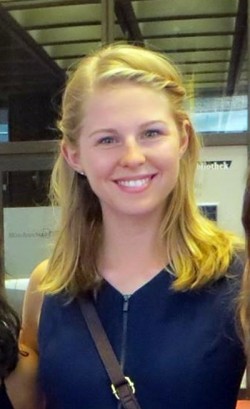
Catching up with Lizzie Marr could be a challenge this summer. Following a year at the Georgia Institute of Technology that saw her earn multiple honors and accolades, she’s giving her passport a good workout and making tracks across Europe as part of the Oxford Study Abroad Program.
“A once in a lifetime experience,” is how Marr, an undergraduate from the McDevit lab, describes her summer following several weeks of jaunting from city to city, as part of “a highly interactive study abroad program that exposes students to a vast range of European cities, as well as historical art, architecture and music.”
Overall, not a bad way to cap a busy and eventful year of university study and research. The highlights for Marr during the 2014-2015 academic campaign include the President’s Undergraduate Research Award and being named Mentor of the Year in BME Mentoring Program. The culmination of it all for Marr was taking first place for research poster presentation in the College of Engineering’s annual Undergraduate Research Spring Symposium.
"It was such an honor,” says Marr, who has trained in the laboratory of Todd McDevitt. “They provide so many opportunities and unrelenting support to their researchers,” says Marr, who also credits the influence of fellow researcher, Ph.D. student Olivia Burnsed. “I could not have achieved what I did without her support and influence. She is such a powerful role model and without her guidance I could not have been awarded these opportunities.”
Marr’s poster was entitled “Determining the phenotypic stability & ex vivo expansion of human chondrocytes on decellularized cartilage microcarriers” and focused on improving treatment of osteoarthritis, the most common form of arthritis, which affects 13.9 percent of U.S. adults aged 25-65 and 33.6 percent of those over 65.
Conventional surgical treatments do not promote cartilage regeneration and are therefore ineffective in the long-run, often leading to consequences like total knee or hip replacement. Plus, these surgeries require long recovery periods and residual weakness is typically detected years after the procedure.
“My project focused on improving chondrocyte expansion, a process necessary to the success of cell based regenerative therapies used to treat osteoarthritis,” explains Marr. “We utilized the extracellular matrix that surrounds chondrocytes in vivo and created microcarriers that utilized influential physiological components to aid in successful expansion of healthy chondrocytes.”
The data from this experiment yielded successful results. Marr and her fellow researchers hope to further explore expansion platforms in future projects. “With further success in these projects, we hope to improve regenerative therapies used to treat patients affected by osteoarthritis,” she says. But first, there is Europe.
Marr has seen a lot of it this summer. Specifically, she’s visited the countries of Austria, Belgium, the Czech Republic, France, Germany, Italy and Switzerland, and their cities, some of Europe’s greatest cultural centers: Paris, Zurich, Venice, Rome, Florence, Munich, Salzburg, Vienna, Prague, Offenbach, Bruges.
“With each destination we are exposed to multiple museums and timeless monuments, as well as operas, symphonies and other musical varieties the city has to offer,” Marr says. “The program does a fantastic job of immersing us in the cultures of the very different regions of Europe, while allowing us to reflect on how all art forms are influenced by history and other cultures.”
Before coming back to the States, Marr and her fellow students abroad will spend five weeks at Oxford University in England. “I’m excited to see what the next half of the program brings,” she says.
Written By: Jerry Grillo


